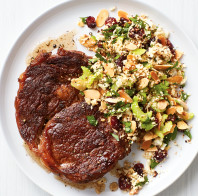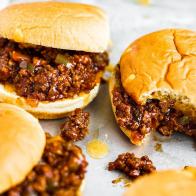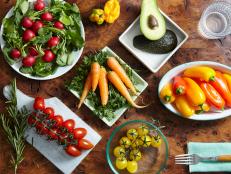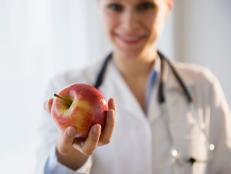12 Important Vitamins Your Body Needs
These vitamins are important to your overall wellbeing. Here's how to eat more of the foods they can be found in.
Related To:
Photo By: Getty Images
Photo By: Getty Images
Photo By: HSR
Photo By: Getty Images
Photo By: Getty Images
Photo By: Getty Images
Photo By: Getty Images
Photo By: Getty Images
Photo By: Getty Images
Photo By: Getty Images
Photo By: Getty Images
Photo By: Getty Images
Photo By: Getty Images
Important Vitamins and What They Do
Vitamins are essential nutrients, all responsible for their own specialized functions. Here’s your essential guide to what some important vitamins do for your body, how they help maintain your health, and where you can find them in food.
Vitamin A
This fat-soluble vitamin maintains healthy skin and bones, and aids immune function. A form of vitamin A knowns as beta-carotene is a cell-protecting antioxidant. Look for beta-carotene in orange- and red-colored foods like sweet potatoes and carrots. Other sources of vitamin A include milk, meat and cheese.
Thiamin
Also known as vitamin B1, this water-soluble vitamin is most often found in fortified grains, legumes and pork. Thiamin plays an important role in using carbohydrates for energy and keeping your nervous system functioning properly.
Riboflavin
Riboflavin is also known as vitamin B2. It is plentiful in a wide range of foods including eggs, whole grains, fortified cereals, dairy and beans. Riboflavin aids the body in using carbs and fats for energy. Water-soluble vitamins like B2 and several others aren’t stored well by the body so daily intake of these foods is the best way to ensure you're getting enough vitamin B2.
Niacin
Niacin is responsible for turning food into energy. Foods rich in niacin include meat, poultry, peanut butter, and legumes, especially lentils. While it is less common for water-soluble vitamins to be toxic, too much niacin (specifically from high doses of supplements) can be harmful, causing flushed skin, headaches, skin rashes, stomach issues and even liver damage.
Folate
You need folate to properly make DNA and for cells to divide properly. It’s also very important for women who may become pregnant and pregnant women since it helps prevent neural tube defects during fetal development. It’s found in fruits, vegetables, nuts and legumes. Folic acid is found in supplements and fortified foods including some cereals, breads and pastas.
Pantothenic Acid
This slightly lesser-known vitamin, also classified as vitamin B5, helps the body properly metabolize fats from the food. It is commonly found in potatoes, mushrooms, sunflower seeds, chicken, eggs, dairy and avocados and is often found in fortified breakfast cereals.
Pyridoxine
You may know this versatile nutrient by the name vitamin B6. This vitamin is involved in more than 100 different enzyme reactions, mostly involved in metabolizing macronutrients. Chickpeas are one of the best sources of vitamin B6 and you can find some in fatty fish (like tuna and salmon) as well as bananas, cottage cheese rice and raisins.
Biotin
Biotin works to convert macronutrients to energy to fuel your body. The use of biotin supplements has become a popular recommendation for stronger hair and nails, however, according to the National Institutes of Health (NIH), there is little evidence to support this claim. You can find biotin in a wide variety of foods including meat, eggs, vegetables, nuts and seeds.
Vitamin D
This fat-soluble vitamin gets all kinds of attention and for good reason — most folks just don’t get enough. You can generate some vitamin D with your skin’s exposure to sunlight, but it still falls short of meeting your needs. Seek out vitamin D from healthy foods including fortified dairy products, egg yolks and fatty fish like salmon. If you suspect a deficiency, work with your doctor and registered dietitian to check your levels and take a properly-dosed supplement.
Vitamin B12
Your body needs vitamin B12 (aka cobalamin) for healthy nerves, blood and the formation of genetic material like DNA. Since it is predominantly found in animal-based foods, vitamin B12 was once a concern for those on a vegan diet. Today, there are several products fortified with vitamin B12 to help folks on a vegan diet get plenty of this vitamin.
Vitamin E
Vitamin E acts as a powerful antioxidant to fight inflammation and protect cells. This fat-soluble vitamin also helps keep the immune and circulatory system functioning properly. Foods like green vegetables, nuts, seeds and plant-based oils are where you’ll find this vitamin.
Vitamin K
Vitamin K is vital for blood clotting and bone health. Adults require 120 mcg per day, this can be achieved from eating 1 cup of raw kale. Vitamin K is also found in spinach, carrots, pumpkin, nuts, blueberries and plant-based oils.

































